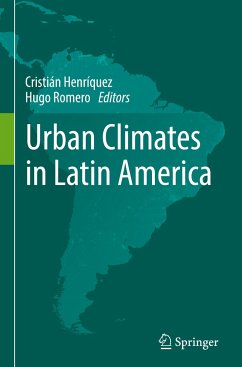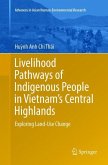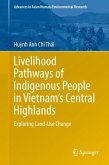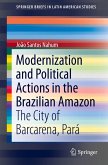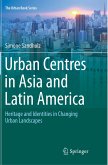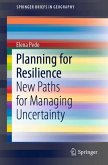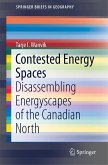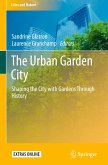Urban Climates in Latin America
Herausgegeben:Henríquez, Cristián; Romero, Hugo
Urban Climates in Latin America
Herausgegeben:Henríquez, Cristián; Romero, Hugo
- Gebundenes Buch
- Merkliste
- Auf die Merkliste
- Bewerten Bewerten
- Teilen
- Produkt teilen
- Produkterinnerung
- Produkterinnerung
This book describes the observation of urban climates in Latin-American and their relationships with urban sprawl, the economic emergence of Latin American countries, social segregation, urban ecology, disasters and resilience. The chapters include contributions dealing with urban heat islands, local climate zones, thermal comfort, air pollution, extreme climate index, green infrastructure, health issues and adaptions based on the socio-economic background of urban areas.
This book revises the role of urban planning and environmental governance, highlighting the singularities in climate adaptation policies in developing countries.…mehr
Andere Kunden interessierten sich auch für
![Livelihood Pathways of Indigenous People in Vietnam¿s Central Highlands Livelihood Pathways of Indigenous People in Vietnam¿s Central Highlands]() Hunh Anh Chi TháiLivelihood Pathways of Indigenous People in Vietnam¿s Central Highlands65,99 €
Hunh Anh Chi TháiLivelihood Pathways of Indigenous People in Vietnam¿s Central Highlands65,99 €![Livelihood Pathways of Indigenous People in Vietnam¿s Central Highlands Livelihood Pathways of Indigenous People in Vietnam¿s Central Highlands]() Hunh Anh Chi TháiLivelihood Pathways of Indigenous People in Vietnam¿s Central Highlands75,99 €
Hunh Anh Chi TháiLivelihood Pathways of Indigenous People in Vietnam¿s Central Highlands75,99 €![Modernization and Political Actions in the Brazilian Amazon Modernization and Political Actions in the Brazilian Amazon]() João Santos NahumModernization and Political Actions in the Brazilian Amazon38,99 €
João Santos NahumModernization and Political Actions in the Brazilian Amazon38,99 €![Urban Centres in Asia and Latin America Urban Centres in Asia and Latin America]() Simone SandholzUrban Centres in Asia and Latin America77,99 €
Simone SandholzUrban Centres in Asia and Latin America77,99 €![Planning for Resilience Planning for Resilience]() Elena PedePlanning for Resilience38,99 €
Elena PedePlanning for Resilience38,99 €![Contested Energy Spaces Contested Energy Spaces]() Tarje I. WanvikContested Energy Spaces38,99 €
Tarje I. WanvikContested Energy Spaces38,99 €![The Urban Garden City The Urban Garden City]() The Urban Garden City97,99 €
The Urban Garden City97,99 €-
-
-
This book describes the observation of urban climates in Latin-American and their relationships with urban sprawl, the economic emergence of Latin American countries, social segregation, urban ecology, disasters and resilience. The chapters include contributions dealing with urban heat islands, local climate zones, thermal comfort, air pollution, extreme climate index, green infrastructure, health issues and adaptions based on the socio-economic background of urban areas.
This book revises the role of urban planning and environmental governance, highlighting the singularities in climate adaptation policies in developing countries.
This book revises the role of urban planning and environmental governance, highlighting the singularities in climate adaptation policies in developing countries.
Produktdetails
- Produktdetails
- Verlag: Springer / Springer International Publishing / Springer, Berlin
- Artikelnr. des Verlages: 978-3-319-97012-7
- 1st edition 2019
- Seitenzahl: 424
- Erscheinungstermin: 6. März 2019
- Englisch
- Abmessung: 241mm x 160mm x 27mm
- Gewicht: 830g
- ISBN-13: 9783319970127
- ISBN-10: 3319970127
- Artikelnr.: 52998668
- Herstellerkennzeichnung
- Springer-Verlag GmbH
- Tiergartenstr. 17
- 69121 Heidelberg
- ProductSafety@springernature.com
- Verlag: Springer / Springer International Publishing / Springer, Berlin
- Artikelnr. des Verlages: 978-3-319-97012-7
- 1st edition 2019
- Seitenzahl: 424
- Erscheinungstermin: 6. März 2019
- Englisch
- Abmessung: 241mm x 160mm x 27mm
- Gewicht: 830g
- ISBN-13: 9783319970127
- ISBN-10: 3319970127
- Artikelnr.: 52998668
- Herstellerkennzeichnung
- Springer-Verlag GmbH
- Tiergartenstr. 17
- 69121 Heidelberg
- ProductSafety@springernature.com
Cristián Henríquez is a Geographer from the Pontificia Universidad Católica de Chile, PhD in Environmental Science from the EULA-Center, University of Concepción, and hold a Municipal Environmental Management Certificate. He is currently the Academic Secretary of the School of History, Geography and Political Science. Associate Professor in the Institute of Geography, associate researcher of the Center for Sustainable Urban Development (CEDEUS), Local Development Center (CEDEL), Environmental Advisory Group (GAMA UC) and Center for Global Change (CCG) of the Pontificia Universidad Católica de Chile. He has been the Head of the Physical Geography Department from 2013 to 2016 and member of the Study Group about Architecture, Geography, Urbanism and Arts of the Chilean National Fund for Scientific and Technological Development, FONDECYT (2012-2015). His research lines of interest are environmental geography with a focus on urban planning and sustainability, mid-sized cities, land-use simulation, urban climatology, and natural risks. He has been consultant and advisor in several studies and projects related to urban planning, climate adaptation, environmental assessment and local environmental management. Hugo Romero-Aravena graduated like Teacher of Geography in Universidad de Chile, received a Master of Sciences in Land Resources Management in Cranfield University (UK) and a PhD in Geography in Zaragoza University (Spain). He is Associate Professor in the Department of Geography in the Faculty of Architecture and Urbanism of Universidad de Chile in Santiago, and Visiting Professor in Brazilian Federal universities of Paraná (Curitiba), El Dorado (Southern Mato Grosso) and Mato Grosso (Cuiaba), Poitiers (France), and Pontificia Universidad Católica Bolivariana (Medellín, Colombia). He has been Head of the Department of Geography, Graduated School and Academic Affairs in the Faculty of Architecture and Urbanism in Universidad de Chile. Between2011 and 2014 directed a multidisciplinary research center about Vulnerability and Socionatural Disasters. His research topic is Regional and Urban Sustainable Development. He received the Geography National Award in 2013 and currently is the President of the Chilean Geographical Society (SOCHIGEO). He is member of the core board of the International Research Institute for Disaster in Tohoku University (Japan).
Chapter 1. Introduction (Cristián Henríquez and Hugo Romero).- Part I: Urban Heat Island, Local Climate Zone and Thermal Comfort.- Chapter 2. Urban Climates of Large Cities: Comparison of Urban Heat Island Effect in Latin American (Pablo Sarricolea and Oliver Meseguer-Ruiz).- Chapter 3. Urban Climate in the South-American Coastal Cities of Guayaquil, Lima, Antofagasta and Valparaiso and its Impacts on the Buildings' Energy Efficiency (Massimo Palme, Luis Inostroza, Geovanna Villacreses, Claudio Carrasco and Andrea Lobato).- Chapter 4. Improving Urban Planning in a Middle Temperate Argentinean City. Combining Urban Climate Mapping with Local Climate Zones (Natasha Picone and Alicia Campo).- Chapter 5. Thermal Differences, Comfort / Discomfort and Humidex Summer Climate in Mar del Plata, Argentina (Mónica García).- Chapter 6. A Comparative Study of Thermal Comfort in Public Spaces in the Cit-ies of Concepción And Chillán, Chile (Pamela Smith, Cristóbal Lamarca and Cristián Henríquez).- Part II: Air Pollution and Urban Climates.- Chapter 7. Urban Air Pollution (Héctor Jorquera, Lupita Montoya and Nestor Y. Rojas).- Chapter 8. Urban Trees and its Relationships with Air Pollution by Particulate Matter and Ozone in Santiago de Chile (Margarita Préndez, Mauricio Araya, Carla Criollo, Claudia Egas, Iván Farías, Raúl Fuentealba and Edgardo González).- Chapter 9. Urban Climates and the Unsustainable Development of Chilean Ci-ties (Hugo Romero).- Part III: Climate Disasters, Health and Urban Resilience.- Chapter 10. The Urban Climate System and the Impacts of Flooding on Rio De Janeiro (RJ), Brazil (Nubia Beray Armond and João Lima Sant'Anna Neto).- Chapter 11. 50-Years of Climate Extreme Indices Trends and Inventory of Natu-ral Disasters in Chilean Cities (1965-2015) (Cristián Henríquez, Jorge Qüense, Claudia Villarroel and Cindy Mallea).- Chapter 12. Urban Climate and Dengue Epidemics in Brazil (Wilson Roseghini, Francisco Mendonça and Pietro Ceccato).-Chapter 13. Green Infrastructure Planning to Tackle Climate Change in Latin American Cities (Alexis Vásquez, Emanuel Giannotti, Elizabeth Galdámez, Paola Velásquez and Carolina Devoto).- Chapter 14. Incorporating Resilience and Adaptive Strategies to Climate Change in Urban and Territorial Planning in Uruguay (Adriana Goñi Mazzitelli, Ingrid Roche, Pablo Sierra and Isabel Gadino).- Chapter 15. Assessing Climate Risk in Small and Intermediate Towns and Cities: A Preliminary Rapid Appraisal Tool and its Application in Florencia, Colombia (Ayesha Salas and Jonathan Barton).
Chapter 1. Introduction (Cristián Henríquez and Hugo Romero).- Part I: Urban Heat Island, Local Climate Zone and Thermal Comfort.- Chapter 2. Urban Climates of Large Cities: Comparison of Urban Heat Island Effect in Latin American (Pablo Sarricolea and Oliver Meseguer-Ruiz).- Chapter 3. Urban Climate in the South-American Coastal Cities of Guayaquil, Lima, Antofagasta and Valparaiso and its Impacts on the Buildings' Energy Efficiency (Massimo Palme, Luis Inostroza, Geovanna Villacreses, Claudio Carrasco and Andrea Lobato).- Chapter 4. Improving Urban Planning in a Middle Temperate Argentinean City. Combining Urban Climate Mapping with Local Climate Zones (Natasha Picone and Alicia Campo).- Chapter 5. Thermal Differences, Comfort / Discomfort and Humidex Summer Climate in Mar del Plata, Argentina (Mónica García).- Chapter 6. A Comparative Study of Thermal Comfort in Public Spaces in the Cit-ies of Concepción And Chillán, Chile (Pamela Smith, Cristóbal Lamarca and Cristián Henríquez).- Part II: Air Pollution and Urban Climates.- Chapter 7. Urban Air Pollution (Héctor Jorquera, Lupita Montoya and Nestor Y. Rojas).- Chapter 8. Urban Trees and its Relationships with Air Pollution by Particulate Matter and Ozone in Santiago de Chile (Margarita Préndez, Mauricio Araya, Carla Criollo, Claudia Egas, Iván Farías, Raúl Fuentealba and Edgardo González).- Chapter 9. Urban Climates and the Unsustainable Development of Chilean Ci-ties (Hugo Romero).- Part III: Climate Disasters, Health and Urban Resilience.- Chapter 10. The Urban Climate System and the Impacts of Flooding on Rio De Janeiro (RJ), Brazil (Nubia Beray Armond and João Lima Sant'Anna Neto).- Chapter 11. 50-Years of Climate Extreme Indices Trends and Inventory of Natu-ral Disasters in Chilean Cities (1965-2015) (Cristián Henríquez, Jorge Qüense, Claudia Villarroel and Cindy Mallea).- Chapter 12. Urban Climate and Dengue Epidemics in Brazil (Wilson Roseghini, Francisco Mendonça and Pietro Ceccato).-Chapter 13. Green Infrastructure Planning to Tackle Climate Change in Latin American Cities (Alexis Vásquez, Emanuel Giannotti, Elizabeth Galdámez, Paola Velásquez and Carolina Devoto).- Chapter 14. Incorporating Resilience and Adaptive Strategies to Climate Change in Urban and Territorial Planning in Uruguay (Adriana Goñi Mazzitelli, Ingrid Roche, Pablo Sierra and Isabel Gadino).- Chapter 15. Assessing Climate Risk in Small and Intermediate Towns and Cities: A Preliminary Rapid Appraisal Tool and its Application in Florencia, Colombia (Ayesha Salas and Jonathan Barton).

